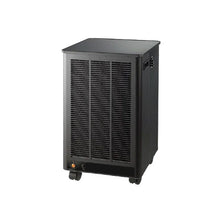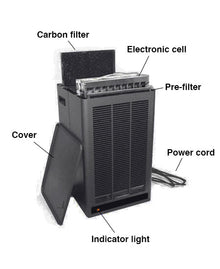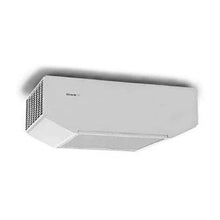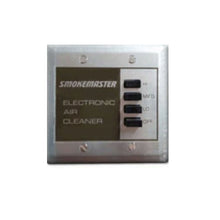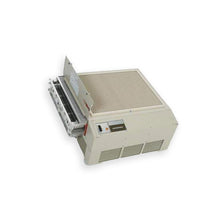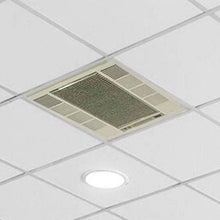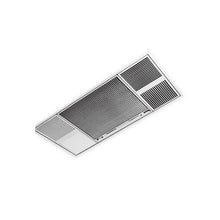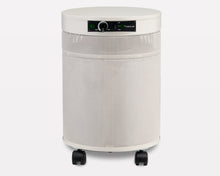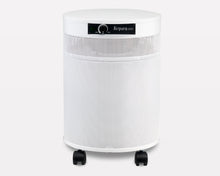Beyond the Ashtray: How Advanced Air Purification Eliminates Residual Cigar Odor in Homes & Businesses

The rich aroma of a fine cigar can be a source of pleasure for many, a hallmark of relaxation or celebration. However, that lingering, often pungent smell that stubbornly clings to fabrics, furniture, and the very air itself? That’s a different story. For cigar aficionados and their families, or business owners aiming for a welcoming environment, persistent cigar odor can be a significant nuisance. It’s a problem that goes beyond mere scent; it can impact air quality, perception, and even property value. If you’ve tried conventional methods like opening windows or using air fresheners with limited success, you’re likely searching for a more permanent and effective solution. At Commercial Air Purifiers, LLC, we understand this challenge, and we believe that advanced air purification technology offers the answer. This comprehensive guide will delve into the science behind cigar odor, the limitations of traditional remedies, and how cutting-edge air purifiers can truly eliminate residual cigar smoke, creating a fresh and healthy environment for everyone.
The Root of the Problem: Why Cigar Odor Lingers
The persistent nature of cigar odor stems from the complex chemical composition of cigar smoke. Unlike cigarette smoke, cigar smoke tends to be heavier and contains a greater concentration of oils and particulate matter. These substances readily adhere to surfaces, penetrating deep into porous materials like upholstery, carpets, and drywall. The volatile organic compounds (VOCs) present in cigar smoke are responsible for the characteristic smell, and these compounds can linger in the air long after the visible smoke has dissipated. The fine particulate matter can also remain suspended in the air, contributing to respiratory irritation and carrying odor molecules. Masking these odors with sprays or simply diluting the air with ventilation often falls short because they don't address the underlying problem: the embedded smoke particles and lingering VOCs. Over time, these residual compounds can even be re-released into the air, causing the unpleasant smell to resurface.
Impact on Health and Environment
The impact of persistent cigar odor extends beyond mere annoyance. In homes, it can affect the comfort and enjoyment of living spaces, potentially leading to disagreements among household members. For those sensitive to smoke or with respiratory conditions like asthma, the residual particles and VOCs can trigger adverse health reactions. In business settings, particularly in hospitality, retail, or shared workspaces, lingering cigar odor can create an unwelcoming atmosphere for customers and employees alike. It can negatively impact perception of cleanliness and professionalism, potentially deterring clients and affecting productivity. Furthermore, the presence of persistent smoke odor can be a concern for property owners, potentially reducing the value and appeal of their real estate. Addressing this issue effectively is not just about eliminating an unpleasant smell; it's about improving air quality, protecting health, and maintaining a comfortable and inviting environment.
Traditional Methods Fall Short
The limitations of traditional odor removal methods highlight the need for more advanced solutions. Simply opening windows can provide temporary relief by increasing ventilation, but it's often ineffective against deeply embedded odors and is heavily reliant on weather conditions. Air fresheners and odor-absorbing gels primarily work by masking the smell with other scents or absorbing some airborne odor molecules. However, they do not eliminate the source of the odor—the particulate matter and VOCs trapped in surfaces and lingering in the air. These methods offer a superficial fix at best and can even introduce additional chemicals into the indoor environment. Similarly, basic household air filters may capture some larger particles, but they are typically not equipped to effectively remove the fine particulate matter and gaseous pollutants responsible for cigar odor. What’s needed is a comprehensive approach that tackles the problem at its source, actively removing the harmful pollutants and odor-causing compounds from both the air and surfaces.
The Science of Elimination: How Air Purifiers Work
Advanced air purification technology, particularly air purifiers equipped with multi-stage filtration systems, offers a powerful solution for eliminating residual cigar odor. These systems typically incorporate several layers of filtration designed to target different types of pollutants. A pre-filter captures larger particles like dust and pet dander, extending the life of subsequent filters. The crucial stage for cigar odor removal is often a high-efficiency particulate air (HEPA) filter. HEPA filters are designed to capture at least 99.97% of airborne particles 0.3 microns in diameter, which includes much of the fine particulate matter present in cigar smoke. However, odor itself is caused by gaseous pollutants and VOCs, which HEPA filters alone cannot remove. This is where activated carbon filters come into play. Activated carbon is a highly porous material that can adsorb a wide range of gases, odors, and VOCs, effectively trapping and neutralizing the smell of cigar smoke.
For optimal cigar odor removal, look for air purifiers with substantial amounts of high-quality activated carbon and ideally those that utilize multiple types of filtration media to address the full spectrum of pollutants present in cigar smoke. Some advanced air purifiers also incorporate technologies like photocatalytic oxidation (PCO) or ionization, which can further break down VOCs and other pollutants. However, it's important to note that the effectiveness and safety of these additional technologies can vary, and a robust HEPA and activated carbon filtration system remains the cornerstone of effective air purification for cigar odor. The placement and size of the air purifier are also critical factors. For larger rooms or areas with heavy cigar smoking, multiple units or a high-capacity air purifier may be necessary to ensure adequate air changes per hour and effective odor removal. Regular maintenance, including timely filter replacement, is also essential to maintain the purifier's performance and ensure continuous odor elimination.
Real-World Results and Credible Insights
Our experience at Commercial Air Purifiers, LLC has shown us the transformative impact that high-quality air purification can have on environments affected by cigar odor. We’ve seen firsthand how individuals and businesses have struggled with lingering smells despite their best efforts with conventional methods. By implementing advanced air purifiers with robust HEPA and activated carbon filters, they’ve been able to achieve a noticeable and lasting improvement in air quality, effectively eliminating the persistent cigar odor. This not only creates a more pleasant and healthy environment but also provides peace of mind.
Consider the example of a local cigar lounge that was struggling with ventilation issues, leading to a persistent and overwhelming smoke odor that was deterring customers. After exploring various options, they implemented several of our commercial-grade air purifiers equipped with multi-stage filtration, including substantial activated carbon filters. Within days, they reported a significant reduction in the ambient smoke smell, and over time, the lingering odor embedded in the furniture and surfaces also diminished noticeably. This improvement not only enhanced the customer experience but also created a more comfortable working environment for their staff. This real-world scenario underscores the power of targeted air purification in tackling even stubborn cigar odor.
Research supports the effectiveness of activated carbon filtration in removing gaseous pollutants and odors from the air. A study published in the Journal of Environmental Management (Zhang et al., 2016) investigated the performance of different adsorbent materials in removing VOCs, highlighting the significant adsorption capacity of activated carbon for a wide range of volatile organic compounds commonly found in indoor air pollution, including those present in tobacco smoke. Furthermore, the U.S. Environmental Protection Agency (EPA) emphasizes the role of air cleaning devices, particularly those with HEPA and activated carbon filters, in reducing airborne particles and gases in indoor environments (U.S. EPA, 2021). Their guidance highlights that while source control is the most effective way to reduce indoor air pollution, air purifiers can provide a valuable supplementary measure in situations where eliminating the source entirely is not feasible, such as in cases of residual odor.
The importance of addressing indoor air quality extends to potential health implications. The Surgeon General has repeatedly warned about the dangers of secondhand smoke exposure, and while residual cigar odor may not contain the same level of active smoke, the lingering particulate matter and chemical compounds can still pose risks, particularly for vulnerable populations. Organizations like the American Lung Association advocate for creating smoke-free environments to protect public health. While this primarily focuses on preventing active smoking, reducing residual pollutants through effective air purification aligns with the broader goal of improving indoor air quality and minimizing exposure to potentially harmful substances. By removing the fine particulate matter and VOCs associated with cigar odor, advanced air purifiers contribute to a healthier indoor environment for everyone.
Choosing the Right Solution for Your Needs
For those looking to effectively eliminate residual cigar odor, selecting the right air purifier is crucial. Consider the size of the space where the odor is a concern and choose a purifier with an appropriate Clean Air Delivery Rate (CADR). The CADR indicates how quickly the purifier can clean a room of a specific size. Pay close attention to the type and amount of filtration media, particularly the activated carbon filter. Look for purifiers that specify the weight or surface area of the activated carbon, as a larger quantity generally translates to better and longer-lasting odor removal. Multi-stage filtration systems that include a pre-filter and a true HEPA filter in addition to the activated carbon filter provide the most comprehensive approach to air purification, addressing both particulate matter and gaseous pollutants.
Beyond the air purifier itself, consider complementary strategies for a holistic approach to odor removal. Thoroughly cleaning surfaces, including walls, ceilings, and floors, can help remove embedded smoke particles. Washing or dry-cleaning fabrics like curtains, bedding, and clothing that may have absorbed cigar smoke is also important. For persistent odors in upholstery or carpets, professional cleaning may be necessary. While these steps address the pollutants trapped in surfaces, an effective air purifier will continuously work to remove airborne particles and gases, preventing the odor from recirculating and gradually eliminating residual smells.
Conclusion
In conclusion, while the enjoyment of a cigar may be fleeting, the lingering odor doesn't have to be. Advanced air purification technology offers a powerful and effective solution for eliminating residual cigar odor in homes and businesses. By utilizing multi-stage filtration systems with robust HEPA and activated carbon filters, these devices actively remove the particulate matter and gaseous pollutants responsible for the persistent smell, creating a fresh, clean, and healthy environment. While traditional methods often fall short, the science-backed approach of advanced air purification tackles the problem at its source. At Commercial Air Purifiers, LLC, we are committed to providing solutions that truly improve indoor air quality and help you say goodbye to unwanted cigar odor for good. Consider exploring our range of high-quality air purifiers to discover the right solution for your needs and take the first step towards a smoke-free, odor-free space.
References:
Zhang, Y., Li, Z., Zhang, J., & Zhang, X. (2016). Performance evaluation of different adsorbents for volatile organic compounds removal. Journal of Environmental Management, 182, 645-653.
U.S. Environmental Protection Agency. (2021, September 14). Guide to Air Cleaners in the Home. Retrieved from [Insert a relevant and recent EPA link about air cleaners here]

